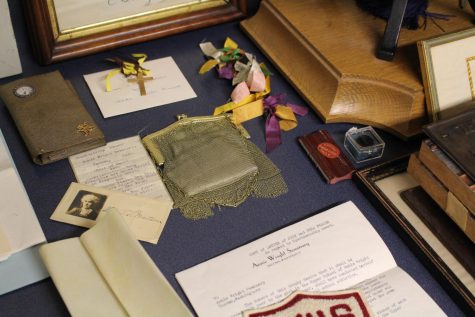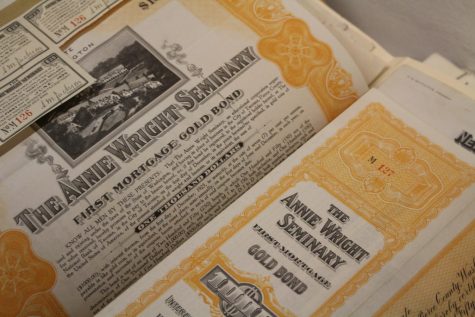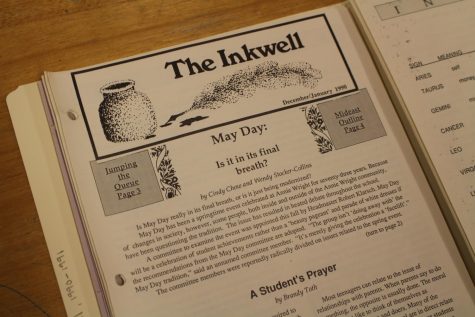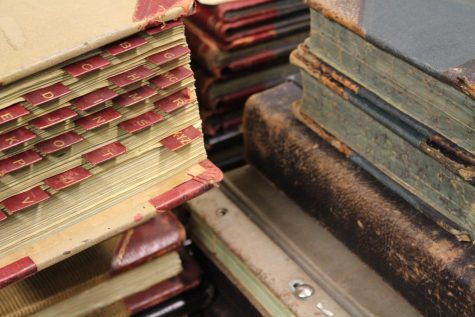Files, Ledgers and Disintegrating Documents: AWS Opens Archive Project
photo courtesy of Sebastian Bush
The archives include documents that have been stored in the main building for nearly 100 years.
December 14, 2022
In accordance with promises from years past, Annie Wright Schools (AWS) has taken the first step in constructing a holistic depiction of the school’s history, dating back to 1884. After implementing a new strategic plan in 2019, AWS launched multiple Diversity, Equity and Inclusion (DEI) working groups aimed at understanding the AWS community through the lens of DEI. One of these groups, originally titled “Completing Our History,” was designated to examine the history of AWS.
Lila Hemsell, an Upper School for Girls teacher, joined this group in the 2020-21 school year. “I felt like there was some contextualization for the school’s history that I didn’t see happening in some of the narratives around [it],” said Hemsell. She added that “there seemed to be a disconnect between that and the way we talk about history in [the International Baccalaureate program].” Hemsell said she wanted to “approach that gap” and get involved.

However, challenges arose in creating this comprehensive historical record. “Basically all of the questions we wanted to ask about the school’s history, any kind of digging into that, required the use of primary sources.” Hemsell continues, “we have this wealth of primary sources to work with, but they were quickly disintegrating, very disorganized, spread all over the school, tucked into weird closets and cubby holes.” She said the working group realized any attempt to answer the questions they had would require organization and preservation of these documents.
Laura Edgar was the person chosen to undertake this task. Upon suggestion from the history working group, AWS hired Edgar, an archivist, to organize a record of all of the documents that had been spread around campus. Edgar described her work as “trying to gather all of the historical records that the school has, dating back to its founding in 1884, and organize them in a way that makes sense.” She said the first step is separating the records: “I’ve got different categories for the school catalog, scrapbooks, student publications, financial records, things like that.”

The next step, Edgar explained, is preserving documents for future use. Edgar utilizes acid-free boxes and folders for organization to ensure they stay in good condition. Finally, Edgar creates an inventory of all of the items she has “so that everybody in the school can have it—that’s sort of making it accessible to students, staff and faculty here.”
Edgar believes that there is incredible value in maintaining a good archive: “I think understanding your history helps you understand your present and where you want to go in the future.” She hopes that the archive can become a tool for all members of the community to use in research or teaching.
Edgar is also interested in maintaining newer documents as well: “we are creating materials everyday like [for example] the issues of Inkwell will be part of the archives this year, right. We will collect them and bring them and save them somewhere.So many people think, ‘oh, I have stuff in my office but it’s from 2005 so nobody cares about that.’” She believes educating people in proper archival practice can ensure that the archive continues to be a valuable resource for years to come.

When asked what she has enjoyed finding the most, Edgar answered “I’ve loved finding the student publications, so like the early newspapers, the yearbooks, literary magazines and things like that. They really give a good look at what’s happening with the student life on campus and that’s that student voice that I think is so good to have.” In addition, Edgar pointed to photographs and catalogs as being important pieces of record that show student life from the past. Although, Edgar explained that her work is not done. “So far, I’ve only looked at and pulled records from the 1880s through the 1960s. So there isn’t anything in this room from the ‘70s forward.”
When it comes to next steps for the history DEI working group, Hemsell is unsure: “I don’t know what they are necessarily.” She agreed with Edgar that continuing to archive current material is important. “One of the things that we presented to the Senior Leadership Team was that our present is our school’s future history, so creating some kind of sustainable way to continue the archival process.” Hemsell was open to anything, saying, “what we talked about is that there’s all kinds of possible next steps.” She pointed to research opportunities as a good example. “Once the archives are in order then any student that has research questions about the school’s history or anything like that can really do that research effectively.”
Annie Wright Schools is in the search for a home for the archive, however, current work is being done in the co-lab connected to the library.









